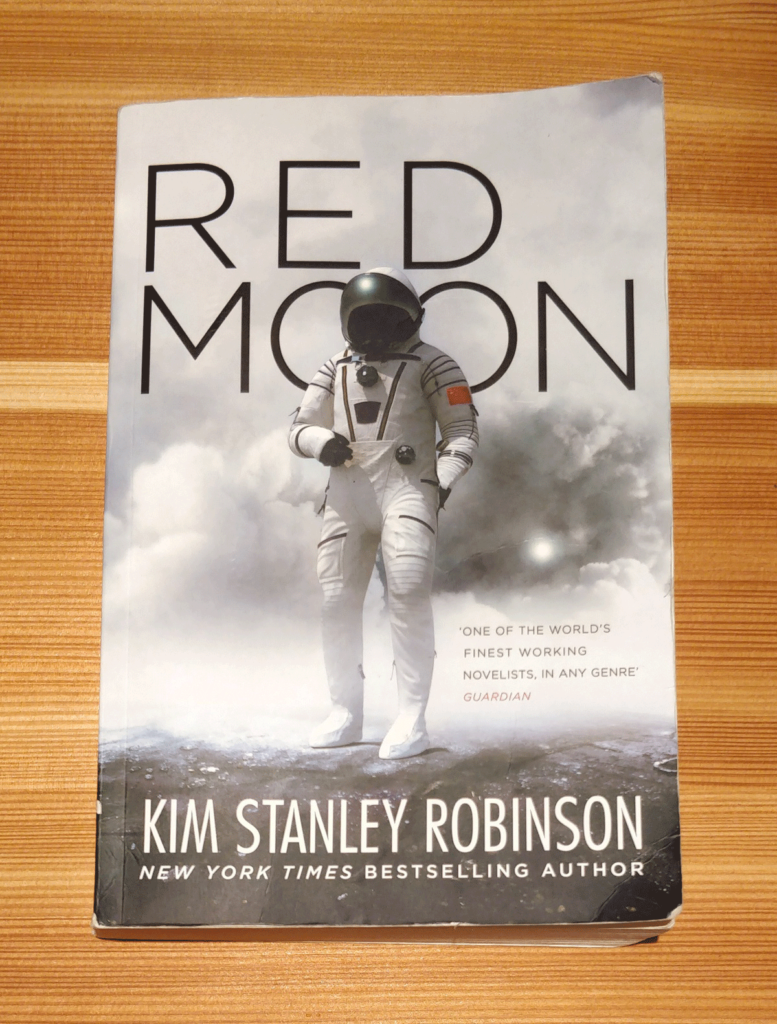Das schöne an dem Magic Future Money-Projekt ist, dass ich, seit ich anderen davon erzähle, immer wieder Tipps und Hinweise bekomme zu Büchern und Projekten, die sich auch mit dem Thema beschäftigen.
So war es auch mit Kim Stanley Robinsons Roman „Roter Mond“, auf den ich wahrscheinlich sonst nicht so schnell gestoßen wäre. Denn Zukunftsgeld spielt in dem Buch nur eine periphere Rolle. Aber es taucht immerhin auf!

Da die Handlung in der nicht allzu fernen Zukunft spielt, haben viele technologische Entwicklungen, die für uns heute noch cutting edge sind, einen Stand erreicht, der echte Anwendungen ermöglicht. Es gibt quantenverschränkte Kommunikation, der Mond ist kolonisiert, und natürlich haben auch die Ideen rund um Blockchain und Kryptowährungen eine neue Stufe erreicht. Neben dem „Virtual US Dollar, einer sogenannten „Cloud-Währung“, gibt es noch eine Reihe weiterer „Blockchain-Währungen“, wobei der „Carboncoin“ die wohl wichtigste davon ist.
Wie Kim Stanley Robinson sich das Geld der Zukunft vorstellt
Ich will gar nicht weiter auf die Geschichte eingehen und die Handlung spoilern, sondern liste hier nur die wenigen Stellen auf, an denen Blockchain-Governance und Geld explizit erwähnt und besprochen werden. Für einen Eindruck, wie das Geld von morgen aussehen könnte, reicht das, auch wenn sich Kim Stanley Robinson leider nicht weit in die Materie vorwagt.
„Blockchain governance? Meaning what?“
„All our activities and decisions are recorded in a secure distributed network, including our comings and goings, but also everything we do as a town. We call it documented anarchy. A full-disclosure commons. Anyone can do anything, but everyone gets to know what that is.“
„And a lot of people are taking their savings out of the banks, like the Americans. A lot of them are moving it into a cryptocurrency called carboncoin.“
„What’s that?“
„I’m not sure. I think it’s a coin that is created or validated by taking carbon out of the air. Something like that. It’s a credit system, and its coins can only buy sustainable subsistence necessities, but since everyone needs those, it’s looking like they’re getting widespread buy-in and acceptance. what will happen if everyone shifts their savings all at once?“
Fred shrugged. „I don’t know.“
The dollar’s trouble weren’t really helping the renminbi, or any of the other national currencies or cryptocurrencies that China has had stockpiled in its half century of trade surpluses. On the contrary, every sector of world finance seemed to be suffering except for the cryptocurrency called carboncoin, which was some kind of money created by a confirmable history of carbon drawdown or equivalent environmental actions, valid for subsistence spending only. What this virtual currency would come to in the real world no one could know, and the fact that millions of people had withdrawn their savings from normal seigniorage currencies to invest in such a murky new form of money, meaning, in the end, value and trust and exchangeability, was just another frightening destabilization to add to all the rest. That the millions of backers of this new currency were also demanding blockchain governance only added to the worries of people in power everywhere.
„Do you understand this idea of blockchain governance?“ Ta Shu asked John Semple at one point.
John shrugged. „I think the idea is that if everyone’s got a wristpad and a connection to the cloud, everyone could participate in some kind of global governance, in which every action legal and financial would be completely documented, and recorded and secured publicly step by step and law by law.“
„It still seems like someone would have to propose laws, and other people would have to enforce them.“
„I think the idea is that it would all happen by collective action, and be open for everyone to see.“
„But who would actually do it?“
„I don’t know.“
„It seems crazy.“
John shrugged. „Maybe every new system of governance looks crazy when it’s first proposed. Remember how in the eighteenth century people seid representative democracy was crazy. They called it mob rule. Said it would never work.“
„Maybe it never did.“
„That person I was talking to on that quantum phone has just given every person in the world a million carboncoins and invited them to join a global householders‘ union, and something like four billion people have already joined!“
Kim Stanlay Robinsons „Roter Mond“ ist auf englisch (8,99 Euro) und deutsch (16,99 Euro) erhältlich.